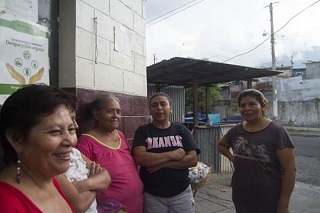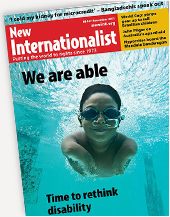‘I was giving presentations on women’s rights with bruises on my face. In my own home there was violence. There was a lot of tension at times.’ Ana Jeannette Mejia is one of the women tackling the issue of violence against women in El Salvador. Whilst educating other women on their rights and helping to give them strength to end it, she was dealing with abuse from her own husband.
Violence is rife in this Central American country. With a relatively small population of around 6.4 million, in August this year alone the National Forensics Institute (ILM) reported 911 homicides – an average of nearly 30 every day – making it the deadliest month since its bloody 12-year civil war ended in 1992. It is estimated that 80% of homicides are related to gangs. Violence is ingrained and, to a certain extent, acceptable. Both gang culture and the endemic ethos of machismo – the concept of being manly and almost superior to women – help to create a world where women regularly suffer at the hands of the men closest to them.
From January to October this year 400 women were murdered. A 2008 nationwide government survey revealed that almost half of Salvadoran women reported experiencing domestic violence, and those are the ones who had the courage to report it. Women are often invisible in official statistics because they are afraid of the consequences of reporting the abuse and they are often ignored by security policies implemented by the government.
Despite being a victim of abuse Ana, 50, decided to join the fight against gender-based violence. She and her fellow campaigner Liudimila de Villamariona work with Christian Aid partner FESPAD in Mejicanos, a municipality close to the capital city of San Salvador, now notorious for gang violence.

‘Since I was a young girl, I’ve loved this type of work,’ says Ana. ‘I was part of the revolutionaries during the war and worked in hidden hospitals for the guerrillas. I have a spirit for service and wanted to make a better life out there.’
As her bruises showed, her husband found it difficult to accept her new role and the local gang members didn’t tolerate it either. Since starting her work with FESPAD, Ana has experienced the wrath of the gang violence so prevalent in this area. Gang members also threatened to kill her husband because she was supporting female victims of violence and abuse, something they were clearly not happy about.
And she isn’t alone; the majority of her female neighbours experience violence at a domestic level.
For this reason, Liudimila and Ana started a committee with the help of FESPAD to support female victims of violence in their community, helping women to stand up for themselves, gain access to the rights they are entitled to and lobby local government to stand up and take action. Today, the committee is 27-women-strong and reaches 300 women across the Mejicanos municipality.

They also travel around their community giving awareness-raising presentations about domestic violence in a bid to educate people about the issue, and to protect and strengthen the position of vulnerable groups within the law.
A lot of women who find themselves associated with gang members, receive discriminatory treatment from the police. Liudimila talks of one case where officers stopped a pregnant woman who was walking down the street, as they knew she was linked to a gang member. They forced her to lie on the ground to check that she wasn’t carrying drugs in her stomach. That same day, she was hospitalized after suffering a haemorrhage.
After this incident, Ana and Liudimila requested, along with members of FESPAD and 15 other women, an audience with the local police chief. Consequently, the chief said he would discuss with his superiors about how orders were being handled in the community.
Yet part of the struggle is giving women the strength to stand up to their attackers. Many of them are financially and sometimes emotionally dependent on their husbands or partners, especially if there are children involved.
In their workshops, FESPAD focuses on two key laws in El Salvador; the First Comprehensive Law for a Life Free of Violence against Women, and the Law of Equality, Fairness and the Elimination of Discrimination against Women. Easy-to-read booklets are available, so women can better understand how to press charges and where to get help. If a woman does require help, FESPAD is on hand to provide legal advice and aid.

Liudimila explains, ‘Now these women know what they can press charges for and what institutions they can go to. If women are better educated about the laws, they can either take care of it themselves or get the proper counsel. Women are able to be more empowered.’
FESPAD trains women like Ana and Liudimila so they have thorough knowledge about human trafficking legalisation, general legal advice, how to access the information and help available, and how to become human rights defenders.
As part of this, FESPAD works with youth groups to raise awareness of violence against women among the younger generation; they also highlight this issue among police officers, who are often unaware of the laws in place to protect women. Female officers have even admitted that they themselves face sexual discrimination within the police force, with some being mistreated by male colleagues.
Ana and Liudimila’s work has boundaries, though. On occasion they have visited places to give workshops only to be told to leave by gang members. This, says Liudimila, is something they have to respect.
But they won’t give up. Despite feeling they can only make small steps, in a limited area, they believe it is vital that they plant the seeds to try to motivate women to make the changes so desperately needed. With women’s rights training and support from organizations like FESPAD, these women can move forward and recover the public spaces where they have a right to speak out, be heard and live a life free from fear and violence.
From 25 November 2015, the International Day of Elimination of Violence Against Women, to 10 December 2015, Human Rights Day, the 16 Days of Activism against Gender-Based Violence Campaign is a time to galvanize action to end violence against women and girls around the world.
![shoes in a street [Related Image]](/web/20160320055016im_/http://newint.org/features/web-exclusive/2015/12/03/image002-590.jpg)



Comments on Fighting for a life free from fear
Leave your comment
Registration is quick and easy. Plus you won’t have to re-type the blurry words to comment!
Register | Login
...And all is quiet.
Subscribe to Comments for this article
Guidelines: Please be respectful of others when posting your reply.